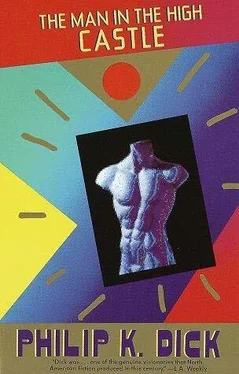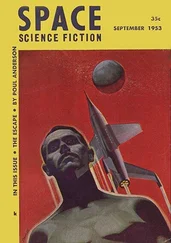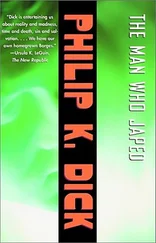It was time for him to graft guest gift.
From his coat pocket he brought small tissue-paperwrapped thing. He laid it discreetly on the low table. Both of them immediately noticed, and this required him to say, “Bagatelle for you. To display fragment of the relaxation and enjoyment I feel in being here.”
His hand opened the tissue paper, showing them the gift. Bit of ivory carved a century ago by whalers from New England. Tiny ornamented art object, called a scrimshaw. Their faces illuminated with knowledge of the scrimshaws which the old sailors had made in their spare time. No single thing could have summed up old U.S. culture more.
Silence.
“Thank you,” Paul said.
Robert Childan bowed.
There was peace, then, for a moment, in his heart. This offering, this—as the I Ching put it—libation. It had done what needed to be done. Some of the anxiety and oppression which he had felt lately began to lift from him.
From Ray Calvin he had received restitution for the Colt .44, plus many written assurances of no second recurrence. And yet it had not eased his heart. Only now, in this unrelated situation, had he for a moment lost the sense that things were in the constant process of going askew. The wabi around him, radiations of harmony… that is it, he decided. The proportion. Balance. They are so close to the Tao, these two young Japanese. That is why I reacted to them before. I sensed the Tao through them. Saw a glimpse of it myself.
What would it be like, he wondered, to really know the Tao? The Tao is that which first lets the light, then the dark. Occasions the interplay of the two primal forces so that there is always renewal. It is that which keeps it all from wearing down. The universe will never be extinguished because just when the darkness seems to have smothered all, to be truly transcendent, the new seeds of light are reborn in the very depths. That is the Way. When the seed falls, it falls into the earth, into the soil. And beneath, out of sight, it comes to life.
“An hors d’oeuvre,” Betty said. She knelt to hold out a plate on which lay small crackers of cheese, et cetera. He took two gratefully.
“International news much in notice these days.” Paul said as he sipped his drink. “While I drove home tonight I heard direct broadcast of great pageant-like State Funeral at Munich, including rally of fifty thousand, flags and the like. Much ‘Ich hatte einen Kamerad’ singing. Body now lying in state for all faithful to view.”“
“Yes, it was distressing,” Robert Childan said. “The sudden news earlier this week.”
“Nippon Times tonight saying reliable sources declare B. von Schirach under house arrest,” Betty said. “By SD instruction.”
“Bad,” Paul said, shaking his head.
“No doubt the authorities desire to keep order,” Childan said. “Von Schirach noted for hasty, headstrong, even halfbaked actions. Much similar to R. Hess in past. Recall mad flight to England.”
“What else reported by Nippon Times ?” Paul asked his wife.
“Much confusion and intriguing. Army units moving from hither to yon. Leaves canceled. Border stations closed. Reichstag in session. Speeches by all.”
“That recalls fine speech I heard by Doctor Geobbels,” Robert Childan said. “On radio, year or so ago. Much witty invective. Had audience in palm of hand, as usual. Ranged throughout gamut of emotionality. No doubt; with original Adolf Hitler out of things, Doctor Goebbels A-one Nazi speaker.”
“True,” both Paul and Betty agreed, nodding.
“Doctor Goebbels also has fine children and wife,” Childan went on. “Very high-type individuals.”
“True,” Paul and Betty agreed. “Family man, in contrast to number of other grand moguls there,” Paul said. “Of questionable sexual mores.”
“I wouldn’t give rumors time of day.” Childan said. “You refer to such as E. Roehm? Ancient history. Long since obliterated.”
“Thinking more of H. Göring,” Paul said, slowly sipping his drink and scrutinizing it. “Tales of Rome-like orgies of assorted fantastic variety. Causes flesh to crawl even hearing about.”
“Lies,” Childan said.
“Well, subject not worth discussing,” Betty said tactfully, with a glance at the two of them.
They had finished their drinks, and she went to refill.
“Lot of hot blood stirred up in political discussion.” Paul said. “Everywhere you go. Essential to keep head.”
“Yes,” Childan agreed. “Calmness and order. So things return to customary stability.”
“Period after death of Leader critical in totalitarian society,” Paul said. “Lack of tradition and middle-class institutions combine—” He broke off. “Perhaps better drop politics.” He smiled. “Like old student days.”
Robert Childan felt his face flush, and he bent over his new drink to conceal himself from the eyes of his host. What a dreadful beginning he had made. In a foolish and loud manner he had argued politics; he had been rude in his disagreeing, and only the adroit tact of his host had sufficed to save the evening. How much I have to learn, Childan thought. They’re so graceful and polite. And I—the white barbarian. It is true.
For a time he contented himself with sipping his drink and keeping on his face an artificial expression of enjoyment. I must follow their leads entirely, he told himself. Agree always.
Yet in a panic he thought, My wits scrambled by the drink. And fatigue and nervousness. Can I do it? I will never be invited back anyhow; it is already too late. He felt despair.
Betty, having returned from the kitchen, had once more seated herself on the carpet. How attractive, Robert Childan thought again. The slender body. Their figures are so superior; not fat, not bulbous. No bra or girdle needed. I must conceal my longing; that at all costs. And yet now and then he let himself steal a glance at her. Lovely dark colors of her skin, hair, and eyes. We are half-baked compared to them. Allowed out of the kiln before we were fully done. The old aboriginal myth; the truth, there.
I must divert my thoughts. Find social item, anything. His eyes strayed about, seeking some topic. The silence reigned heavily, making his tension sizzle. Unbearable. What the hell to say? Something safe. His eyes made out a book on a low black teak cabinet.
“I see you’re reading The Grasshopper Lies Heavy ,” he said. “I hear it on many lips, but pressure of business prevents my own attention.” Rising, he went to pick it up, carefully consulting their expressions; they seemed to acknowledge this gesture of sociality, and so he proceeded. “A mystery? Excuse my abysmal ignorance.” He turned the pages.
“Not a mystery,” Paul said. “On contrary, interesting form of fiction possibly within genre of science fiction.”
“Oh no,” Betty disagreed. “No science in it. Nor set in future. Science fiction deals with future, in particular future where science has advanced over now. Book fits neither premise.”
“But,” Paul said, “it deals with alternate present. Many well-known science fiction novels of that sort.” To Robert he explained, “Pardon my insistence in this, but as my wife knows, I was for a long time a science fiction enthusiast. I began that hobby early in my life; I was merely twelve. It was during the early days of the war.”
“I see,” Robert Childan said, with politeness.
“Care to borrow Grasshopper ?” Paul asked. “We will soon be through, no doubt within day or so. My office being downtown not far from your esteemed store, I could happily drop it off at lunchtime.” He was silent, and then—possibly, Childan thought, due to a signal from Betty—continued, “You and I, Robert, could eat lunch together, on that occasion.”
Читать дальше










